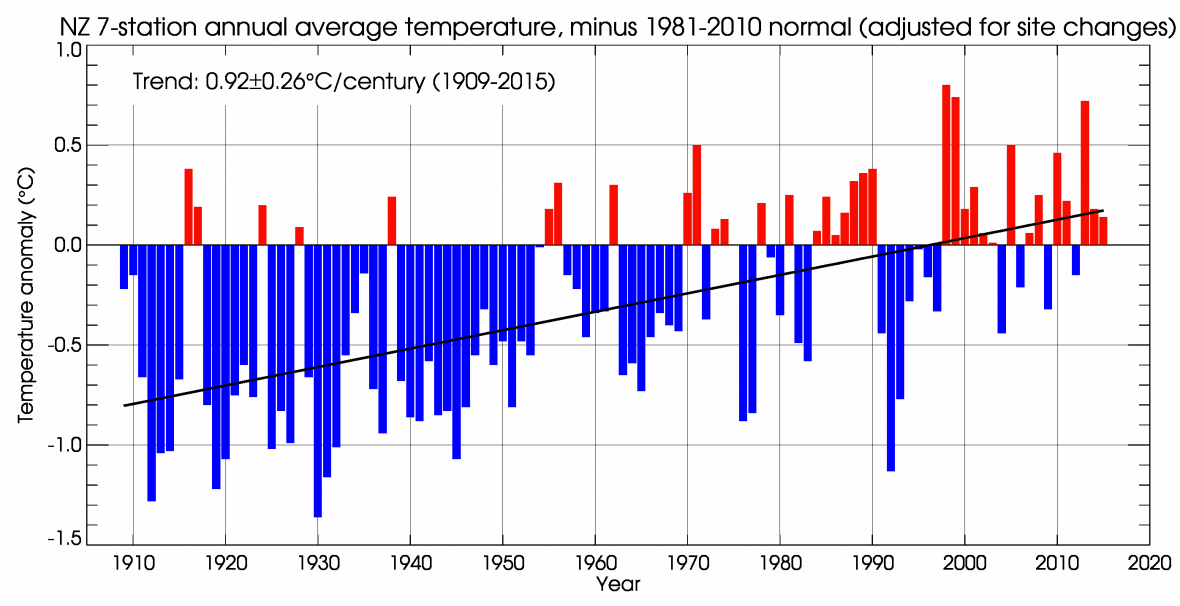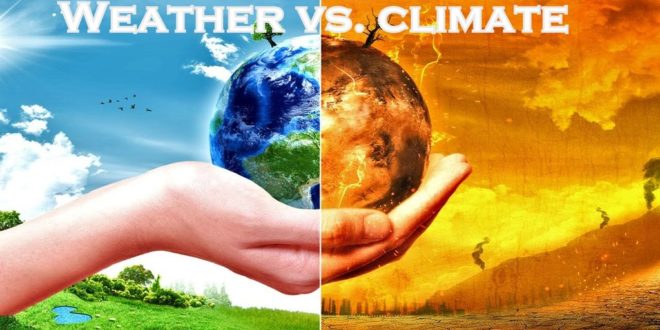OPINION: Over the past summer there have been some fairly extreme bouts of weather – temperatures in Australia have been at record levels, there seem to have been an unusually large number of storms on the Kapiti Coast causing erosion, there has been a record level of rain up North and of course we have now had record blizzards sweeping the NE of the USA. And all these events are quite different in character – the only link is that that have all occurred in a particular period of time.
It raises the question of whether fundamental changes are occurring and if so why. I note that there is a tendency to link extreme weather events to climate change – a link for which incidentally there is no convincing evidence – it appears that extreme weather events are genuinely random. So, it is useful to start with some discussion on the difference between weather and climate and then come back to the original issue.
Weather vs. climate
 The issue of the difference between weather and climate can be very confusing. Part of the difficulty is that they are each part of each other and the distinctions are to a degree arbitrary. However, at the extreme some of the distinctions are very clear cut, in particular:
The issue of the difference between weather and climate can be very confusing. Part of the difficulty is that they are each part of each other and the distinctions are to a degree arbitrary. However, at the extreme some of the distinctions are very clear cut, in particular:
- Weather is a short-term phenomenon while climate describes long term situations and changes. What is happening this week or this month compared to the norms or records for this time of the year is all about weather – what is happening this decade compared with previous decades is getting into the climate area.
- Weather is dramatically changeable, not only from day to day but year to year. You only have to look at the record to see dramatic differences in several degrees of temperature, levels of rainfall and so on between comparable time periods, year by year. Climate, on the other hand, is more about long term trends over several years. That is why climate scientists tend to work from baselines which contain decades of data.
The most important implication is that it is not reasonable to draw conclusions about climate from the weather data for any particular year. As I pointed out in a previous article it is quite possible to have an unusually hot summer in the midst of a period of climate cooling (that happened in NZ in the 50s and 60s), and vice versa.
 There are connections of course because the phenomena are so closely linked. So if the weather shows a consistent pattern over several years then that might begin to say something about climate. The number of years required tends to be much longer if the overall pattern is one of little change because the pattern becomes buried in the “noise” from year to year variation in the weather. Strong patterns are much easier to pick up. And of course, the patterns might be related to other things entirely. We just don’t know enough about the climate system to be sure.
There are connections of course because the phenomena are so closely linked. So if the weather shows a consistent pattern over several years then that might begin to say something about climate. The number of years required tends to be much longer if the overall pattern is one of little change because the pattern becomes buried in the “noise” from year to year variation in the weather. Strong patterns are much easier to pick up. And of course, the patterns might be related to other things entirely. We just don’t know enough about the climate system to be sure.
Something that has changed over the past century at least is the human footprint on the landscape. Landscapes have been denuded of bush and trees that provided natural moderation of the impacts of extreme conditions, and human structures have gone up everywhere including on known flood plains and in situations which are only just above high tide level. So, without question, the damage from extreme events has increased and in some cases quite dramatically – but that is a human impact, not a result of changes in the weather or in the climate.
So, what about recent events?
The discussion below is about recent events on the Kapiti Coast because I know the area but I am sure an interesting discussion could be had about other areas as well.
The past year on the Kapiti Coast has been very confusing. In 2016 we had the best summer for over 30 years and the good weather lasted for almost a full 6 months. The cool westerly gales normally prevalent in Wellington were almost entirely absent. It was not only unusual but contrary to the usual pattern that occurs with an El Nino event which is what we had. However, this year 2016/17 we have had the worst summer in Wellington for about 30 years. So, we have gone from record best to near record worst in only a year!!
 The past year also seems to have been characterised by quite large and persistent westerly gales or storms along the Kapiti Coast and this is causing significant erosion in some parts – particularly areas such as Raumati and also areas protected by sand dunes. Does that mean that the weather has fundamentally changed? Well not necessarily at all. There are up cycles and down cycles in weather patterns and I well remember problems with erosion back in the 1960s, again particularly in Raumati. And there is a reserve area in Paekakatriki that is permanently banned for housing because of past erosion, which has actually been relatively stable for close to 30 years now. But that could change very quickly.
The past year also seems to have been characterised by quite large and persistent westerly gales or storms along the Kapiti Coast and this is causing significant erosion in some parts – particularly areas such as Raumati and also areas protected by sand dunes. Does that mean that the weather has fundamentally changed? Well not necessarily at all. There are up cycles and down cycles in weather patterns and I well remember problems with erosion back in the 1960s, again particularly in Raumati. And there is a reserve area in Paekakatriki that is permanently banned for housing because of past erosion, which has actually been relatively stable for close to 30 years now. But that could change very quickly.
The real lesson from all of this is that weather patterns, particularly in our part of the world, are not stable in the long term and it is possible to get extreme weather events with all the attendant problems at any time – and it is quite possible for this to happens in clusters ie in more than one year. But it is equally possible to have very benign weather over long periods of time. So is prudent to take advantage of the good bits when you get them and be prepared for the worst when it inevitably happens.
By Bas Walker
This is another of Bas Walker’s posts on GrownUps. Please look out for his articles, containing his Beachside Ponderings.









Join the Discussion
Type out your comment here:
You must be logged in to post a comment.